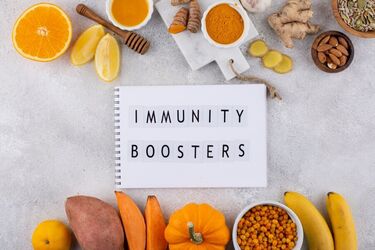Do dietary supplements and treatments really affect immunity?

Ads for dietary supplements, superfoods, and intravenous "vitamin cocktails" often promise to boost immunity and activate the body's natural defenses. Is this true? How can the immune system be supported and are there any natural immunostimulants?
According to Robert H. Schmerling, MD, a British researcher of autoimmune and rheumatic diseases, you may be surprised by the truly effective ways to support the immune system.
Intravenous cocktails, supplements, and superfoods: "top" products for immunity
Manufacturers of dietary supplements, vitamins, and superfoods most often offer these products to the mass consumer to maintain and "boost" immunity:
Intravenous drips containing various vitamins, minerals, and supplements are available in many clinics and even salons. Manufacturers of such vitamin cocktails claim that their formulas are designed to boost immunity. Such intravenous treatments are dangerous and can cost a lot of money," Schmerling says.
Dietary supplements and vitamins. Popular options include turmeric, milk thistle, and echinacea, often in combination with vitamins and other trace elements. There are hundreds of formulations available from different manufacturers.
Superfoods and foods to avoid. If you search for "foods to strengthen the immune system" on the Internet, you will see thousands of articles promoting blueberries, broccoli, spinach, dark chocolate, and other foods that protect against infections. There is also a list of foods to avoid, such as sugary drinks and highly processed meats, which are supposedly harmful to our immune system.
Cleansing and detoxification procedures. No doubt you have seen advertisements for cleansing and detoxification products that are designed to remove toxins from the body. They often warn that there are many harmful substances in the environment that enter the body through air, water, and food, making our immune system weak.
How are intravenous drips, supplements, and detoxification products controlled?
None of the above products are controlled by the FDA, experts emphasize. In fact, the standard disclaimer for the claimed immune-boosting properties looks something like this: "This statement has not been evaluated by the FDA. This product is not intended to diagnose, treat, or prevent any disease."
"Nevertheless, the advertisement is allowed to use phrases such as 'boosts immune function' and 'supports immune health'. These terms have always seemed vague to me. They can also be confusing," says Dr. Schmerling.
"Only vaccinations can boost immunity," the researcher says. "They prepare our immune system to fight certain infections, such as the flu shot before each flu season. Immune support usually refers to vitamins such as vitamin C or other nutrients necessary for a healthy immune system.
"It is true that a deficiency of vital nutrients can lead to poor immune function. However, this does not mean that a person with normal nutrient levels can expect supplements to improve their immune system," Schmerling emphasizes.
Can immunostimulants really boost the immune system?
Unless you're deficient in a particular nutrient, such as vitamin C or zinc, the short answer is no, experts say. There is no conclusive evidence that any particular product can significantly improve immune function in healthy people.
For example, the results of studies of various supplements for colds and other similar infections have been mixed. Even if taking a particular supplement reduced the severity or duration of an infectious disease, there is no evidence that the supplement improved overall immune function.
This also applies to individual foods. None of them have ever been shown to improve immune function. A balanced diet, rather than individual foods, can influence overall health and well-being.
The same approach applies to advice on foods to avoid, such as sugary drinks and highly processed meats. The foods to avoid to support the immune system are the same foods to limit for good overall health.
What is really good for the immune system?
According to Robert H. Schmerling, it's neither a mystery nor a product: what's good for overall health is also good for immune function. To effectively support the immune system, the researcher makes the following recommendations:
- Eat well and follow a heart-healthy diet, such as the Mediterranean diet;
- exercise regularly and maintain a healthy weight;
- do not smoke;
- if you drink alcohol, drink only in moderation;
- maintain good sleep hygiene;
- minimize stress;
- to prevent infection with SARS and other viruses, wash your hands frequently, avoid large crowds, and wear masks when recommended.
Diseases such as HIV, certain types of cancer, and autoimmune diseases, as well as their treatment, can affect the immune system. Thus, some people need additional drug therapy to support their immune system.
Perhaps the time will come when we will know how to boost immune function beyond the usual recommendations for a healthy lifestyle. "Until we study this topic more thoroughly, I would not rely on individual foods, detoxification programs, oral supplements, or IV drips to support immune system health," says Schmerling. According to the expert, the most reliable and effective way to support the immune system is to live a healthy and active lifestyle, follow the Mediterranean diet, and minimize stress.
